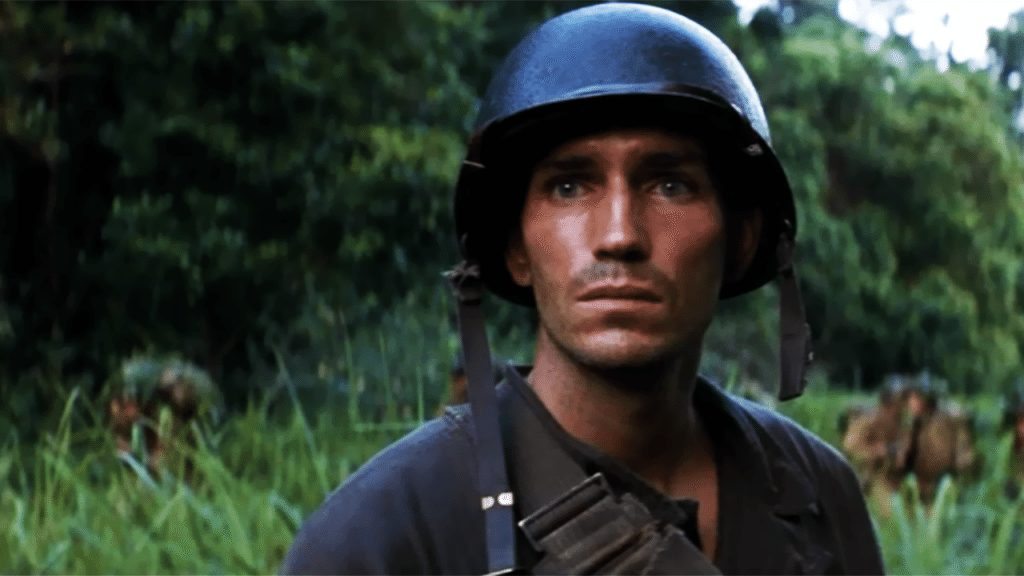Anyone who has ever had someone die on them, or known a person who died and heard the news, can recall exactly what they were doing at the time of witnessing or hearing of the event. I had a female friend pass away when I was a young man. Though we were not dating at the time, the loss was profound for me, and I don’t believe I was equipped to deal with the loss. I still remember our time spent together tearing up the California hillsides with her on the back of my motorcycle. She was young and so was I. She perished in a fiery car crash and could not be pulled from the vehicle by the responding officer. The flames consumed her. To this day I still cannot imagine the pain and fear she must have felt.
Years before that I had another young friend die. He was 17.
Today, we ask the same of young men and women, which we have always in the matters of life and death, war and peace; we ask for them to emotionally handle the passing of another human-being particularly while serving in our military. This is not an easy task, especially for those who don’t have the support of their direct family and friends, as they serve away from home. The members of their unit are their family and that family should help them get through any kind of fight.
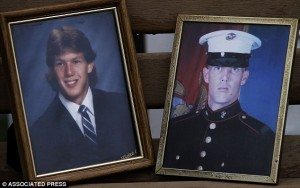
We ask much of them. The military is the backbone of our national security strategy. They are the ones we send out to ensure the peace and prosperity, not only of our nation, but of our world. I still recall operating in an AO and learning about four soldiers who died from an IED explosion, and then another three were soon after killed in a separate IED explosion, within the month. As a soldier, the news was disheartening, but as the military is trained to do everyone must press on. The average age of someone dying in Iraq was 27 years. Think about that. Let it sink in and think about it.
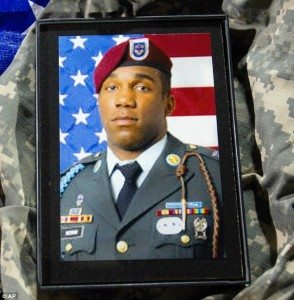
Anyone who has taken part in combat patrols knows how you must steady your mind in order to focus on the task at hand. You just put any doubts and fears away, compartmentalize them, in order to be an asset to your team. We ask our troops to do this everyone time they leave ‘the wire’. Every Soldier, Marine, Airman, or Seaman knows their expiration date is dialed up to a sooner time. Think about that.
The war in Iraq has been declared over now by President Obama and likely forgotten by his administration. For those who have lost someone their memory is never forgotten. The families who lost Marine Pvt. Jonathan Lee Gifford, who was killed just two days into the Iraq war, and Specialist David Emanuel Hickman who was the last to die before troops were withdrawn is not forgotten. It will take decades for historians to unravel what occurred on the battlefields of Iraq and Afghanistan but any sterile or dispassionate assessment can never recount the full value of a young man or woman’s life. No one can do that. We can recognize here that these two men were imbued with something that many who are not warfighters can never comprehend; that truest brotherhood and your humanity is found most readily in sacrificing for others. It means to surrender your person or surrendering a possession to a higher purpose.
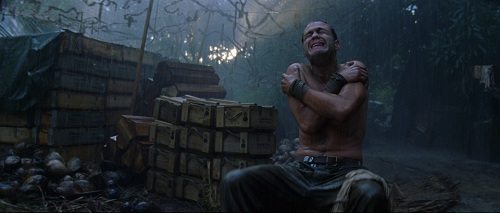
Death, dying, severe injury and any kind of proximity to death is an odd and severely profound thing. If we can survive its presence, to allow even the smallest amount of humanity to work in us, I believe it can transform us for the better. We go on to become productive citizens rather than the stereotypes depicted in Hollywood movies. I believe that families, whom give up their sons and daughters to serve our nation, and warriors who fight for our great nation know this feeling of humanity better than anyone. Just ask some of the families of police officers and warfighters the pain they must feel. But in that pain there can be a transcendence into a life others cannot comprehend.
In the cinematic masterpiece the Thin Red Line, the character Private Edward P. Train states,”One man looks at a dying bird and thinks there’s nothing but unanswered pain. That death’s got the final word, it’s laughing at him. Another man sees that same bird, feels the glory, feels something smiling through it.” Train is an outsider looking in. He is a voyeur into the world of battle. He is a detached observer.
Private Witt, played by the great Jim Cavaziel states, “I remember my mother when she was dyin’, looked all shrunk up and gray. I asked her if she was afraid. She just shook her head. I was afraid to touch the death I seen in her. I couldn’t find nothin’ beautiful or uplifting about her goin’ back to God. I heard of people talk about immortality, but I ain’t seen it. I wondered how it’d be like when I died, what it’d be like to know this breath now was the last one you was ever gonna draw. I just hope I can meet it the same way she did, with the same… calm. ‘Cause that’s where it’s hidden – the immortality I hadn’t seen.”
Witt wonders how it will be when he dies. He wonders if there is bliss after death. Train and Witt cannot know if there is immortality. Witt wants to know if he will meet death with the same calm as his mother. He says, “I wondered how it’d be when I died. What it’d be like to know that this breath now was the last one you was ever gonna draw. I just hope I can meet it the same way she did, with the same . . . calm. Because that’s where it’s hidden, the immortality that I hadn’t seen.”
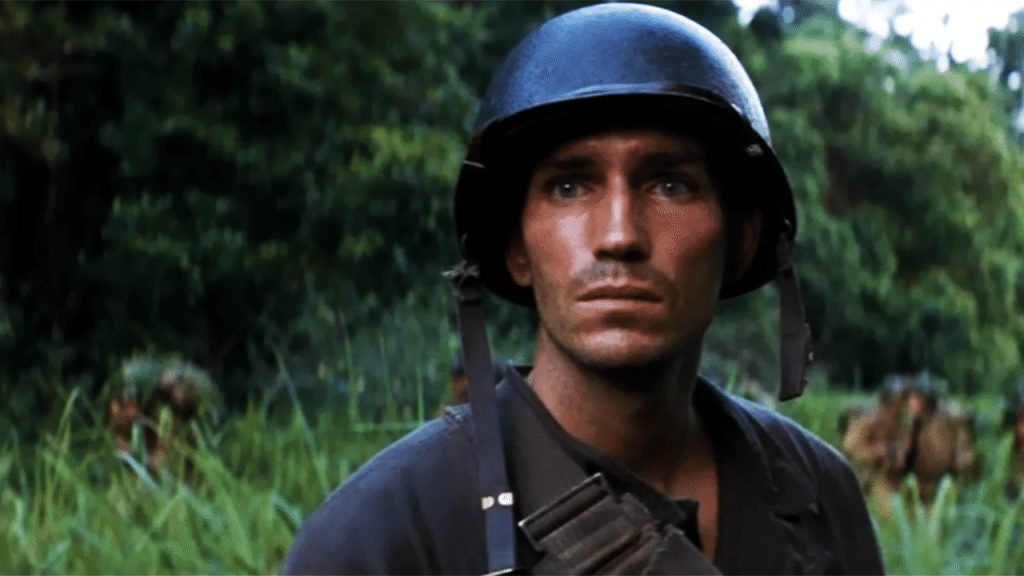
The soldiers of Charlie Company blaze through Guadalcanal and time and time again Pvt. Witt consistently saves members of his company by his brave actions. Where Sergeant Welsh or Pvt. Train see nothing but death and pain, Witt in turn sees good in all men and glory in the world. Witt sees the goodness in humanity, that transcends men, cultures, tribes and nations, that Train and Welsh cannot see. They have let death transform them in another way by looking at war and life as mechanical constructs that cannot be transcended. Witt sees life otherwise however he is uncertain if glory exists in the hereafter. After a vicious hill battle Charlie Company meanders up a river under the leadership of an incompetent lieutenant named Band. Japanese artillery-fire falls close to their position. Rather than retreating, the clueless Band sends a scouting party up the river to check for the enemy, and three soldiers go out; Coombs, Fife and Witt.
Pvt Witt once again bravely volunteers because the other two are terrified. As they cut through thick jungle they encounter an advancing Japanese column and two of the men are shot. Coombs floats downriver and the corporal survives. To buy time for Corporal Fife to go back and inform Charlie Co. Witt uses himself as a decoy to lead the Japanese soldiers further away. Witt makes the sound of a bird call. With the Japanese in pursuit Witt finds himself in a jungle clearing. The Japanese soldiers flank Witt and he is now surrounded with their rifles pointed at him. He turns and looks at all of them.
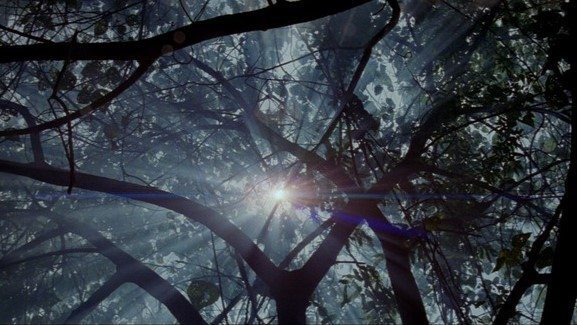
A Japanese leader is screaming at him. Witt knows he is going to die. Witt seems peaceful and calmly raises his rifle. He is shot several times. The camera cuts to the jungle canopy and shows rays of light shining through the trees. The camera slowly zooms into Witt’s face and it is blissful….We know Witt has felt all the power and the glory. The camera cuts again to children swimming under water and Witt is swimming alongside them. A melody plays.
In his final act of sacrifice Witt has completely transcended himself and the world. In the black inhumanity of war Witt released his ego and emptied himself of selfishness. The question we have to ask ourselves is, “Why does it take death and suffering to bring us to the recognition of the glory of life?” Ecclesiastes 7:2 notes:
It is better to go to the house of mourning than to go to the house of feasting, for this is the end of all mankind, and the living will lay it to heart.
Whether we share the opinions of Witt, Band, Train or Welsh, it is clear that many of us if given a second chance at more life would gladly take it. Some people get caught in the existentialist trap of questioning too often the meaning of life. They cannot operate outside of their mental circling and in turn feel a dislocation with society that is at odds with everyone else. They have a sense of being alone and isolated from the world, they have a dissatisfaction with their life, and they believe that life has no purpose or meaning no matter HOW MUCH life they are given. They in turn do not live at all. Leo Tolstoy wrote:
“What is life? To die? To kill myself at once? No, I am not afraid? To wait til death comes? I fear that even more. Then I must live, but for what? In order to die? And I could not escape from that circle.”
How do we get out of this malaise in our way of thinking? Honor the dead my friend. Honor the dead. Go to a war memorial or parade and see the cost given that ensured your way of life is preserved. Sacrifice my friend and in doing that you will find brotherhood with someone. Love my friend and in that you will find peace in your heart. Live your life my friend and in that you will more readily accepting of one day dying.
Every soldier wants to live but not are all accepting of the possibility of dying. Military indoctrination and the law enforcement academies are good places for indoctrination and preparation for handling what might come the moment they leave the safety of those institutions doors. Many in our society seem to think that removing all guns is the answer to achieving peace. The answer to achieving peace is understanding that it may require war against those who desire only war. Those who truly want peace must be willing to go to war to have it, or to let others do it without encumbering them. It was not until I began serving others did I begin to understand the sanctity of life and the need to preserve it. I did not understand this as a young man.
I am not saying that only those who serve in the military, law-enforcement, or fire & rescue are the only ones who understand the sacredness of life and death just because they are around it so much. I am saying anyone who is around death has more opportunity to observe it and more readily understand the importance of life and the need to preserve it. It is easy to love and to give to those who are lovable people or to those whom give us something in return; anyone can do that. But can we live for others? Can we see the good in others even if many of them don’t share our opinions, beliefs and interests? I think most law enforcement personnel and warfighters can tell you the good they see in others, despite the bad they fight, on a daily basis. Yes, they recognize evil, but they recognize as a whole how good humanity is. They are out there serving and putting themselves at risk. Their families are at home holding it all together.
Sergeant Welsh believes in nothing and all things amuse him. Thin Red Line Author Jim Jones, wrote of the character,”Everything amused Welsh . . . Politics amused him, religion amused him, particularly ideals and integrity amused him; but most of all human virtue amused him. He did not believe in it and did not believe in any of those other words.” It is Welsh’s contempt for all good things that cannot get him out of the spiritual malaise he is trapped in. Witt on the other hand used what precious little time of life he had to save all of Charlie Company.
The ending of the movie cuts to a scene with Pvt. Train. No longer is he the terrified observer. Nor is he the contemptuous person that Sergeant Welsh is. His life has changed. As they board a landing craft, Train tells another soldier,
“I’m determined now. I’ve been through the thick and thin of it. I may be young, but I’ve lived plenty of life. I’m going to start living it good. You know, my daddy always told me it will get a whole lot worse before it gets better. Cuz you know, life is not supposed to be that hard when you’re young. I figure after this the worse will be gone. It’s time for things to get better. That’s what I want. That’s what’s going to happen.”
Train is hopeful. He has allowed himself to see the good in living. He has learned that life has tasks and purpose and it’s worth living. We get a view looking straight down from the stern of the ship. The waters are roiling behind it as it cuts through the water. The camera rises to show the island retreating in the distance. We hear the voice of Witt and he says,
“Oh my soul, let me be in you know. Look through my eyes, look out at the thing you made, all things shining.”
i thank You God for most this amazing
day:for the leaping greenly spirits of trees
and a blue true dream of sky; and for everything
which is natural which is infinite which is yes
(i who have died am alive again today,
and this is the sun’s birthday; this is the birth
day of life and of love and wings: and of the gay
great happening illimitably earth)
how should tasting touching hearing seeing
breathing any–lifted from the no
of all nothing–human merely being
doubt unimaginable You?
(now the ears of my ears awake and
now the eyes of my eyes are opened)
e.e. cummings
1894-1962
originally published Sept 7th, 2015

